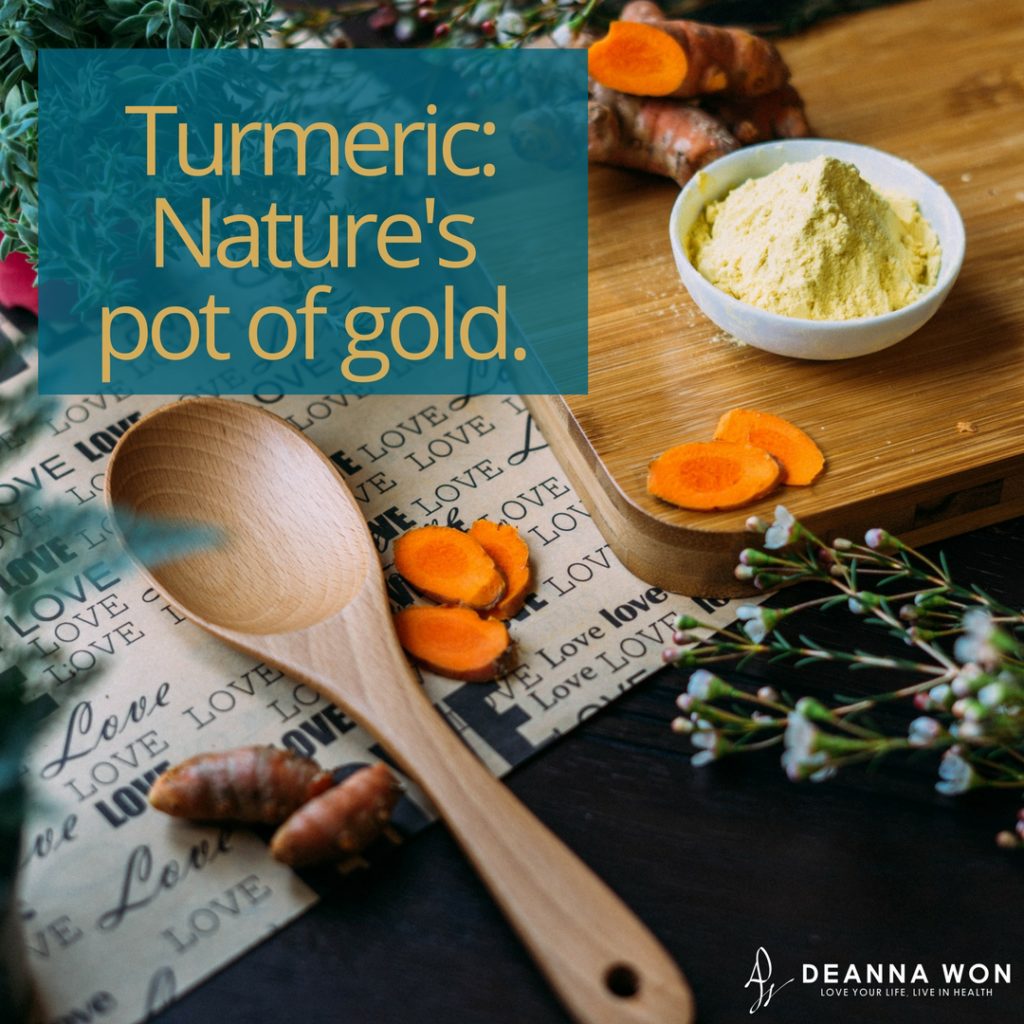While using turmeric root to treat physical conditions may be new for some, it has, in fact, been used for its many healing benefits for thousands of years. Turmeric, known also as its botanical name, Curcuma longa, is a member of the ginger family and has played a very important role in Eastern cultures.
This vibrant, bright orange spice has been used in culinary dishes, religious services, and for its medicinal benefits for approximately 4,000 years, and is what gives curry its distinctive bright yellow and orange color. Ayurveda, the practice of holistic medicine in India, has included turmeric in the treatment of a wide range of ailments, including cancer. Since it has been such a widely known and appreciated herb in India for so many years, India produces and consumes approximately 80% of the world’s supply of turmeric.
The main component of turmeric that provides it with so many medicinal benefits is curcumin. In the recent years, more and more people are becoming familiar with the amazing benefits of curcumin. What are some of these amazing benefits?
Anti-inflammatory. Inflammation is a necessary process that our bodies undergo as part of our natural healing process. When our bodies become inflamed on occasion as part of the healing process, this is considered “acute inflammation.” However, when our bodies are so toxic and overwhelmed that we are now in a constant state of inflammation, we are now experiencing chronic inflammation, which has now been proven to be the precursor of many diseases.
As an anti-inflammatory, curcumin works in our bodies at the molecular level to reduce inflammation. It has even been proven to be just as effective, if not more, than anti-inflammatory drugs, according to a study published by the National Center for Biotechnology Information. Some research has shown that curcumin is very capable of interacting with a number of molecular targets that are involved in inflammation. At this level, curcumin is able to block NF-kB, a molecule that travels into the nuclei of cells and turns on genes that promote inflammation, and believed to play a major role in many chronic diseases.
Antimicrobial. Curcumin has been proven to kill bacteria by weakening and penetrating its membrane. In a study where curcumin was added to a list of bacteria, including Staphylococcus aureus, Escherichia coli, Enterococcus faecalis, and Pseudomonas aeruginosa, curcumin was successful in killing all of the bacteria within two hours. Since more people are developing a resistance to pharmaceutical antibiotics, the natural, plant-derived curcumin can provide antibiotic benefits without some of the less desirable side effects of the antibiotics.
Antimutagenic. If a substance is antimutagenic, that means that it would be effective in the prevention of cancer and other genetic diseases because it could prevent genetic mutations in DNA. In laboratory studies, curcumin has a proven ability to protect DNA from damage and structural changes. When studied on cancer cells, curcumin acts as a prooxidant agent, allowing free radicals to oxidize cancer cell DNA thereby inducing apoptosis, or cell death. In healthy cells, curcumin acts as an antioxidant, which protects free radicals from causing any cellular damage through oxidation. Some studies believe that the use of curcumin may prevent the onset of cancer. Although research is still being conducted on curcumin’s effects on cancer cells, there is growing evidence that it may become the future of cancer treatment and prevention in the Western world.
Antioxidant. This property is what keeps the number of free radicals in our bodies in balance. If our bodies have a higher number of free radicals, oxidative stress can occur, which is now believed to be a significant contributor to aging, inflammatory diseases like arthritis, heart disease, Alzheimer’s disease, and cancer. Oxidative stress is also associated with the structural changes and functions of important organic substances such as fatty acids, proteins, and DNA. As an antioxidant, curcumin can neutralize free radicals in the body while also boosting the body’s own natural antioxidant enzymes. It’s interesting to note that the rate of Alzheimer’s Disease in India is extremely low, which could very well have to do with the high usage of turmeric in Indian cuisine.
Detoxicant. As you know, our bodies are continuously being bombarded by toxins, which can place a undue burden on your liver. Curcumin can lower the liver’s toxicity level by assisting it in flushing out toxins. Bile, which is created by the liver to break down fats and to excrete toxins from the body, can be stimulated by the introduction of curcumin in the body. In a laboratory setting, toxins were more easily eliminated when curcumin was introduced to the test subjects. It can also aid in repairing any liver damage. Additionally, curcumin also removes cholesterol from the liver by increasing its LDL receptors.
Neuroprotective. Curcumin provides great benefits to the brain and nervous system. It balances the neurotransmitters of bipolar patients, reduces inflammation of the brain in Alzheimer’s patients, improves memory and alleviates depression. In fact, Indian researchers have found that using curcumin is just as effective as Prozac in treating patients with depression.
With all of the benefits that curcumin can provide, it’s a great addition to your daily diet. For inflammation prevention, the recommended daily dose is around 500 milligrams, up to three times per day. Because curcumin is not water soluble, it is best consumed with healthy fats like organic olive or coconut oils. Consuming turmeric with black pepper, with the main bioactive ingredient called piperine, can increase your body’s absorption of curcumin by 2000%. What are some ways to incorporate turmeric into your diet?
Salad and Salad Dressing:
Increase your turmeric consumption by adding to your salads and vegetables. Simply mix olive oil, black pepper, and a half teaspoon of turmeric and add to your vegetables. I personally like to also slice fresh turmeric root into my salads. While it has a woody, and slightly bitter flavor, I’ve acquired a taste for this golden root as I reflect on all the powerful benefits it is providing to my body.
Golden Milk:
Another way to increase your turmeric intake is by drinking golden “milk.” This can be made by bringing coconut or almond milk to a boil. Once boiling is achieved, reduce the heat to a simmer and add 1 teaspoon of turmeric, 1 teaspoon of virgin coconut oil, a dash of cinnamon, and ground pepper. To sweeten, add local honey or stevia to taste. Some say that this drink also aids in improving sleep when consumed in the evening, due to the turmeric’s anti-inflammatory properties.
Turmeric Tea:
Bring four cups of water to a boil. Once the water has reached its boiling point, reduce the heat to a simmer, adding one inch of turmeric root and one inch of ginger. Let the tea simmer for 10 -15 minutes (you’ll notice the color change in the water). When the tea is finished, add stevia or local honey to taste and a dash of black pepper to increase the absorption of the curcumin.
As a topical paste:
Add approximately half a cup of turmeric powder and a dash of black pepper to one and a half cup of boiling water. Reduce to a simmer, continuing to stir until a paste is produced. Allow the mixture to cool before use. It can be stored in the refrigerator for up to two weeks. (A friend of mine used this mixture on her husband’s injured ankle after dealing with over six months of swelling. Once he began applying this mixture to his swollen ankle twice a day, the swelling resolved in a matter of days.)
In addition to using the root or powder forms of turmeric, one can also benefit from using a turmeric essential oil. In this form, it can be added to your tea, your food, or applied directly to inflamed areas of your body. Because the turmeric essential oil is already in the form of a fat, it is easier for your body to absorb its properties. To amplify the absorption rate, you can also add black pepper or black pepper essential oil to your food and topical applications.
Although there aren’t any known interactions with turmeric, there have been some rare instances where copious amounts of turmeric may potentially cause stomach upset or heartburn. For those taking medications for diabetes, turmeric may reduce blood sugar levels. It’s always best to start off with a low dosage to determine how your body reacts to it.
While we, in the west, are still learning about its many healthy and disease-preventive benefits, this herb has been used successfully for thousands of years in Ayurvedic medicine. As more research continues to be conducted, this herb may soon, perhaps one day, be considered as a viable replacement for many of the drugs that are being used today for inflammation, brain health, cancer treatment and prevention.
Ready to make your health a priority? Contact me here to schedule your consultation.
Sources:
https://www.healthline.com/nutrition/top-10-evidence-based-health-benefits-of-turmeric
https://www.turmericforhealth.com/turmeric-benefits/100-awesome-health-benefits-of-turmeric-curcumin
https://www.drweil.com/vitamins-supplements-herbs/herbs/turmeric/
https://www.wellandgood.com/good-food/turmeric-anti-inflammatory-dosage/
https://thetruthaboutcancer.com/brain-health-benefit-of-turmeric/
https://draxe.com/turmeric-benefits/
http://www.webmd.com/vitamins-supplements/ingredientmono-662-turmeric.aspx?activeingredientid=662
https://www.organicfacts.net/health-benefits/herbs-and-spices/turmeric.html
https://www.ncbi.nlm.nih.gov/pubmed/19594223
https://www.ncbi.nlm.nih.gov/pmc/articles/PMC3249911/
https://www.ncbi.nlm.nih.gov/pubmed/11909768
https://www.ncbi.nlm.nih.gov/pmc/articles/PMC1906592/
https://www.researchgate.net/publication/257464260_Antibacterial_effects_of_curcumin_An_in_vitro_minimum_inhibitory_concentration_study
https://naturallyhealthynews.com/blog/could-curcumin-be-the-new-antibiotic/
https://www.turmericforhealth.com/turmeric-benefits/benefits-of-turmeric-for-liver
https://www.turmericforhealth.com/turmeric-benefits/can-turmeric-help-in-bipolar-disorder
https://www.theawesomegreen.com/turmeric-golden-milk-for-a-better-sleep/
http://www.livestrong.com/article/211962-turmeric-liver-detox/
https://www.ncbi.nlm.nih.gov/pmc/articles/PMC4374920/
https://www.ncbi.nlm.nih.gov/books/NBK92752/
https://www.ncbi.nlm.nih.gov/pmc/articles/PMC3249911/#ref17
https://www.ncbi.nlm.nih.gov/pmc/articles/PMC2527619/
https://draxe.com/turmeric-essential-oil/
https://www.organicfacts.net/health-benefits/herbs-and-spices/turmeric.html

